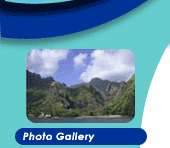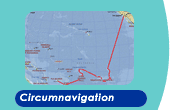May 20, 2003
Denarau Anchorage
Denarau Island, Viti Levu, Fiji
Beaching the Cat
By Lois Joy Go
to beaching the cat photo journal
 
At 1000 we pull the anchor, buried in oozy mud. It makes a giant sucking
sound, like the hundreds of U.S. jobs that Ross Perot said would go
to Mexico with the implementation of NAFTA. Pacific Bliss just sits
here calmly in the still bay. The instruments show Force 0 wind. The
sky is a baby blue with the kind of white fleece clouds one sees on
a toddler’s pajamas. Yet Gunter and I sit here fraught with fear
and trepidation, as we watch the clock. We are waiting until exactly
45 minutes after high tide. Then we will motor to a mud bar within the
marina harbor and attempt to beach the Cat. We pray for God to send
a Guardian Angel to keep Pacific Bliss safe in this maneuver. Then we
bellow out a primal scream, waving our hands above our heads to release
the tension: “A-a-ah!” We start the engines. After sailing
over 17,000 miles—one-half way around the world—we are beaching
Pacific Bliss for the first time.
We snake through the smooth waters of the well-marked Denarau Marina
channel, meeting two excursion yachts, Captain Cook Cruises and Whales
Tale, as their passengers wave to us. A pair of huge moon jellyfish
glide along: one floating flat like a purple-rimmed plate, the other
puffing open its bell, gently trailing its translucent tentacles.
As in a film set to slow motion, we wind around the posts where the
workhorse vessels tie, toward the post with the huge sign sporting an
anchor symbol with a red slash running diagonally through. NO ANCHOR.
It goes against the grain to continue to inch forward.
“Nice and easy now,” I caution Captain Gunter at the controls.
We stop on the bank, water all around us, with no sound, no scrape,
just a gentle settling. We are beached.
Gunter deploys the dinghy, Petit Bliss, and checks the depths at the
props, dagger boards, and rudder. I mark down the measurements. “She
must be resting on her belly,” says Gunter.
“Two bellies,” I respond, “like a pair of beached
whales.”
“Piece of cake,” said Gunter, “beaching a Cat.”
But beaching the Cat was only part of the story…the worst was
yet to come.
______________________________________________________________________________
May 21, 2003
Unbeaching the Cat
I awaken at 0600 after a fitful sleep. The sky has barely begun to
lighten. The tide has risen and fallen and is now rising again. Yesterday
our trusty mechanic here, David, along with his assistant, came to the
mudbar where we now reside and successfully replaced the zincs. The
most difficult part of our maneuver is yet to come. Today we must unbeach
the Cat.
By the time I sit at the helm seat with my morning coffee and the sun
breaks gloriously over the highlands of Viti Levu, we have already discussed
our options. We checked out one possibility: whether our spare anchor,
the Danforth, would hold sufficiently in the mud to winch Pacific Bliss
off into the deeper waters there. It won’t. So we retrieve our
bow anchor.
The tide is rising nicely. Pacific Bliss has shifted in her muddy cradle
with a little more weight toward the stern. I see that as a good sign,
perhaps she will float off all by herself at high tide! Captain Gunter
is not persuaded. His dire ruminations had kept him awake most of the
night. He feared that we had miscalculated… How could that have
happened despite our careful planning?
• We beached her at exactly one hour after high tide, so that
the high tide the next day would float her off.
• But every night since the highest tide at the recent full moon,
the high tide is less; e.g., for May 20th the tide table forecasts 1.7m
at 0932; for May 21st it predicts 1.6m at 1029.
• The evening tide at 2227, which we stayed up for, was a little
lower than the daytime tide: 1.5m. We didn’t want to float her
off in the dark anyway, but when we walked around the top deck at 10:30PM,
she was clearly not floating. That’s what caused our angst.
• We should have been more conservative, perhaps waiting until
two hours after high tide, we now calculate. We left little margin to
allow for a falling high tide. In fact, to be really conservative, we
should have planned the maneuver during a rising high tide, before the
full moon. Waiting on this mud bank for the next full moon, however,
is not a viable option!
• Fortunately we are in mud instead of sand. It should be easy
to hire workmen to dig two channels to pull the hulls back, but that
would entail at least another day. Unfortunately, we are in the mud
instead of sand. Pacific Bliss could have settled in with all her weight,
nesting comfortably in a cradle of mud. After all, she didn’t
budge at high tide last night.
We tie our long ‘palm-tree’ line to one of the poles to
which the barges tie up. We winch it tight. The tide is slowly—agonizingly
slowly—rising. The measurement at the swim ladder is 3.1’
vs. the 3.5’ when we beached. The bottoms of the daggerboards
are tight into the mud. Gunter has lifted them up as far as they will
go. He starts the engines. “Just to give it a little test,”
he says. Pacific Bliss does not budge.
Gunter talks to the barge Captain on VHF 69. He will deploy his motorboat
(with a 30hp outboard) at 1015, 15 minutes before high tide. If that
fails to work, he’ll use the barge proper. “But I do not
think that will be necessary,” he says.
For a five long minutes we agonize over the potential damage to the
daggerboards, or worse yet, the rudders. Then we pray again for the
safety of Pacific Bliss. It is now time for action. Gunter deploys a
second heavy line to use, if needed, as a towline for the barge. We
have already tied a number of our dock lines together for the dinghy
tow.
At 1015 the man motions to me from the barge. I signal for him to come
over. We offer the captain and crew $50 Fijian to help get us off, money
well spent. We fashion a bridle to the little boat and cleat it at each
stern hull of Pacific Bliss.
Both of our 40hp engines are now revving in reverse. The men in the
boat pull their line taut. The long line to the pole is winched taut.
It is 1030, high tide.
“Let her roll!” says Captain Gunter. Pacific Bliss joyfully
leaps backward, her engines purring, happy to be out of the mud. After
all, she is a sailing vessel, not a pig. I don’t think she liked
the mud flat any more than we did!
I always find it amazing how fast a positive situation can deteriorate
on a boat. The barge crew failed to watch the towline. They had let
it go slack, and their line began to drift underneath our prop. By then,
Thank God, the engines were in neutral. But it took Gunter quickly donning
his mask and fins and diving underneath the hull to free the line.
We had arranged for space on Denarau’s dock with the Mega Yachts.
But first, we anchored in the bay, washed Pacific Bliss decks with our
salt-water hose, and shared a can of ice cold Fiji Bitter. We hope that
it will be some time before our next adventure!
Go
to beaching the cat photo journal
journal103.html
|











